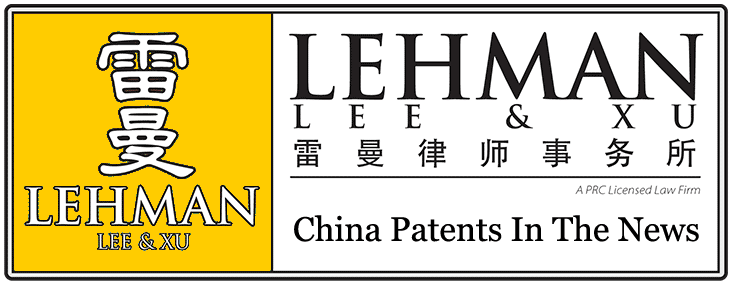
November , 2011
 |
|
LEHMAN, LEE & XU
|
|
China Patents In The News
|
|
November , 2011 |
The China Law News keeps you on top of business, economic and political events in the China. |
|
|
|
In the News |
Apple and the Slide to Unlock Patents! |
|
On October 25, 2011 the USPTO granted Apple a patent (8,046,721) for "Unlocking a device by performing gestures on an unlock image". Almost every touchscreen smartphone manufactured, uses slide to unlock technology. It seems like the Apple patent, could potentially be a problem for smartphone manufactures. However, many individuals propose that this patent should not have been issued because of the prior art that was available, such as the Neonode N1m which has been discontinued. It seems like many people forgot that Apple already has patented the slide to unlock feature, (Patent 7,657,849---which is cited in the "721" patent) so unless the Neonode has related prior art before December 23, 2005, the Neonode is not prior art. The "721" patent is a continuation of the "849" patent, therefore the "849" patent is not counted as prior art. As a result, the "849" patent is not invalid in light of the "721" patent, and most likely if the prior "721" patent has not been found invalid, nor will the "849" patent. |
Two Years after Implementation, New Patent Law Works Well |
|
October 1 this year marks the 2nd anniversary of the implementation of the third revision of Chinese patent law. According to statistics, as of August 31, 2011, SIPO had received over 1,600 patent applications with forms of disclosure of origin of genetic resources; as of September 30, SIPO had examined more than 76,000 petitions for foreign filing license; from November 1, 2009 to August 31, 2011, SIPO received 252 requests for evaluation report for design patent. It took SIPO over a year to receive the first 800 of the above-mentioned 1,600 applications while the rest 800 arrived within the period from January to August 2011. Web link: http://english.sipo.gov.cn/news/iprspecial/201110/t20111028_626818.html
|
China¡¯s Copycat Culture |
If you¡¯re worried about China overtaking the United States as one of the world¡¯s leading innovators, consider this: While Americans mourned the passing of Steve Jobs last month, the Chinese had just finished closing near-perfect copies of Apple retail outlets in the southwestern city of Kunming. While one country celebrated a man who represented three decades of new ideas, another was still playing whack-a-mole with companies that do nothing more than copy. Of course, technology has always spread by adopting the innovations of others. The journeymen of medieval Europe traveled around working with diverse masters to learn new techniques, and Jobs got his inspiration for screen menus and the mouse on a visit to Xerox¡¯s research lab in 1979. But too often China¡¯s purpose is not to build on what the competition has done, but simply to steal its work and underprice it. |
China Law News |
CONTENTS_______________________________________________________________________
China to adopt tougher rules on organ donorsChina Daily China moves to beef up lending to small firmsBEIJING - China has implemented a slew of measures to guide banks to loan more to small and micro-sized enterprises, and 27.9 percent of all outstanding loans by September went to those companies, the country's banking regulator said Monday. Private lending may get its official chancePRIVATE lenders may soon come out from the gray zone as China for first time will legalize private lending to increase financial support for the agriculture sector and smaller enterprises, a central bank official said yesterday.
|
|
|
|
|